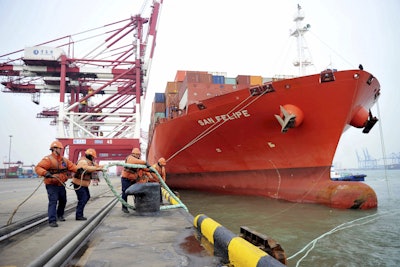
China's exports surged in February while its politically sensitive trade surplus widened amid mounting tension with Washington.
Exports rose 44.5 percent over a year earlier to $171.6 billion, accelerating from January's 11.1 percent growth, customs data showed Thursday. Imports rose 6.3 percent to $137.8 billion, down sharply from the previous month's 36.9 percent rate.
Trade data are distorted by the Lunar New Year holiday, which falls at different times in January or February each year. Data for the combined two-month period, which economists often use to screen out the holiday influence, showed exports rising by a robust 24.4 percent over a year earlier, up from December's 10.9 percent growth.
"Both foreign and domestic demand look healthy, though imports are not as robust as during the same period last year," said Julian Evans-Pritchard of Capital Economics in a report.
"The bigger picture is that while China's trade surplus with most of the world has declined during the past year thanks to the stronger Chinese demand for commodities, its surplus with the U.S. has continued to expand."
China's global trade surplus widened to $33.7 billion from January's $20.3 billion. For the two-month period, the surplus expanded by 31 percent from a year earlier to $55.3 billion.
The February surplus with the United States was $20.9 billion.
Beijing's steady accumulation of multibillion-dollar trade surpluses with the United States has prompted demands for import controls.
President Donald Trump's administration has increased duties on Chinese-made washing machines, solar modules and other goods it says are being sold at improperly low prices. It is due to announce results of a probe into whether Beijing improperly pressures foreign companies to hand over technology, which could lead to further penalties.
Chinese officials say Beijing is not actively pursuing a large trade surplus but is ready to respond to U.S. import controls.
Beijing has accused Trump of threatening the global trade regulation system by taking action under U.S. law instead of through the World Trade Organization. It has filed a challenge in the WTO against Washington's latest trade measures.
On Thursday, Foreign Minister Wang Yi warned a "trade war" would hurt all sides and appealed for a negotiated settlement.
"China will of course make a proper and necessary response," said Wang at a news conference held during the annual meeting of China's legislature. "We hope both parties will find a mutually beneficial solution through equality and constructive dialogue."
Forecasters expect Chinese demand to weaken this year as Beijing tightens controls on lending to slow a rise in debt. That is a blow to its Asian neighbors, for which China is the biggest export market, and for suppliers of iron ore and other commodities such as Brazil and Australia.






















